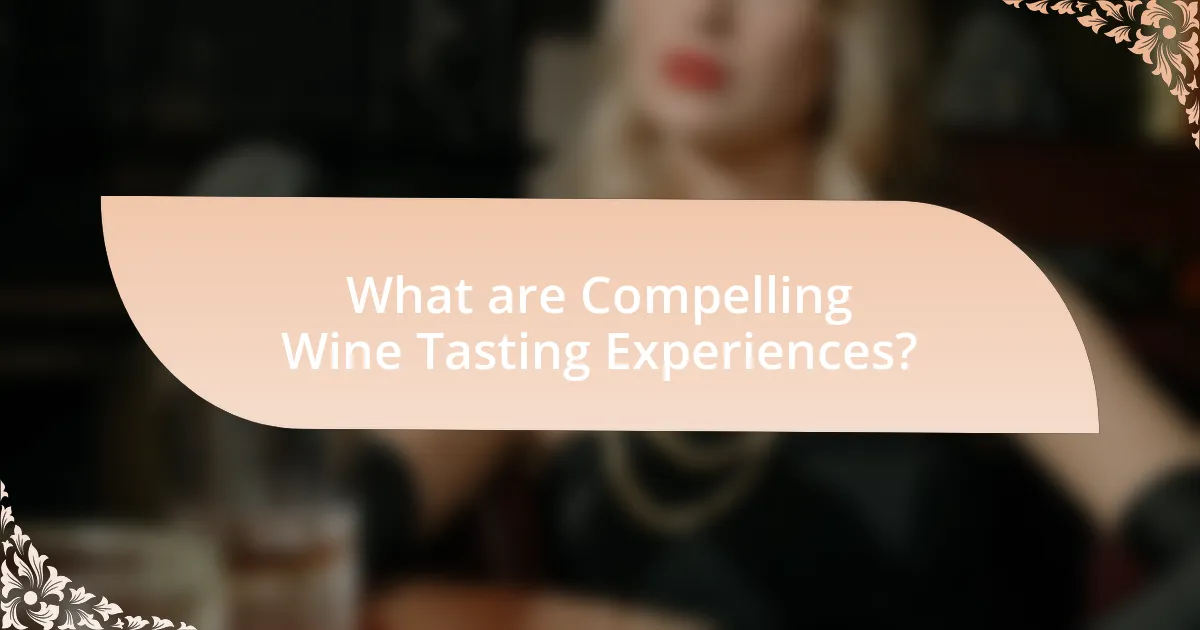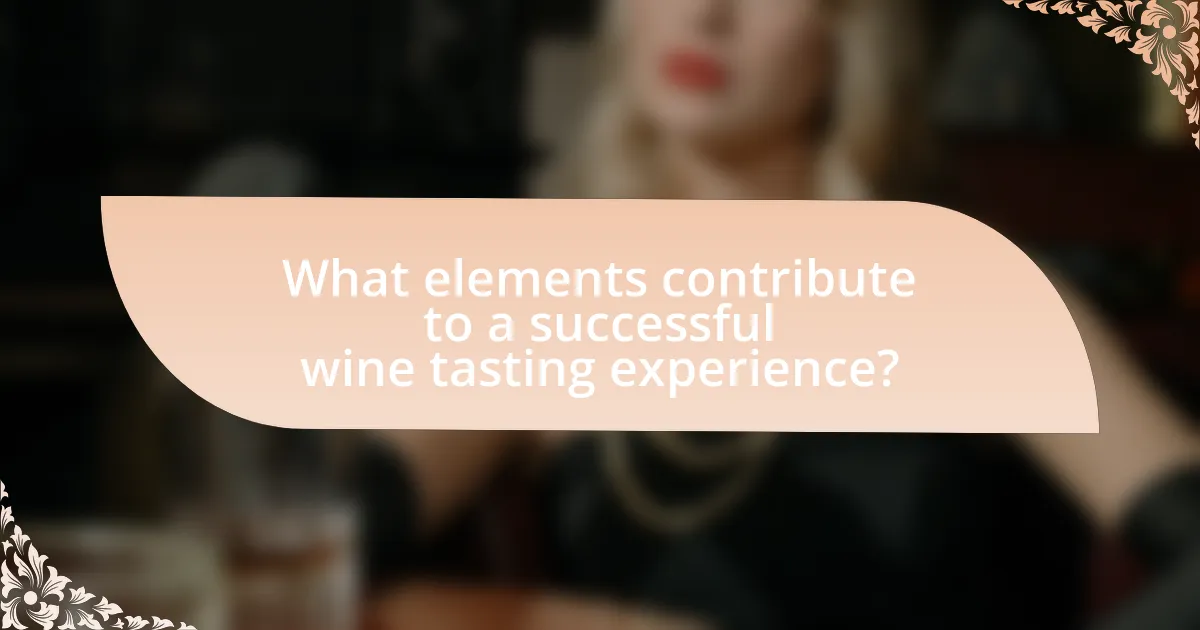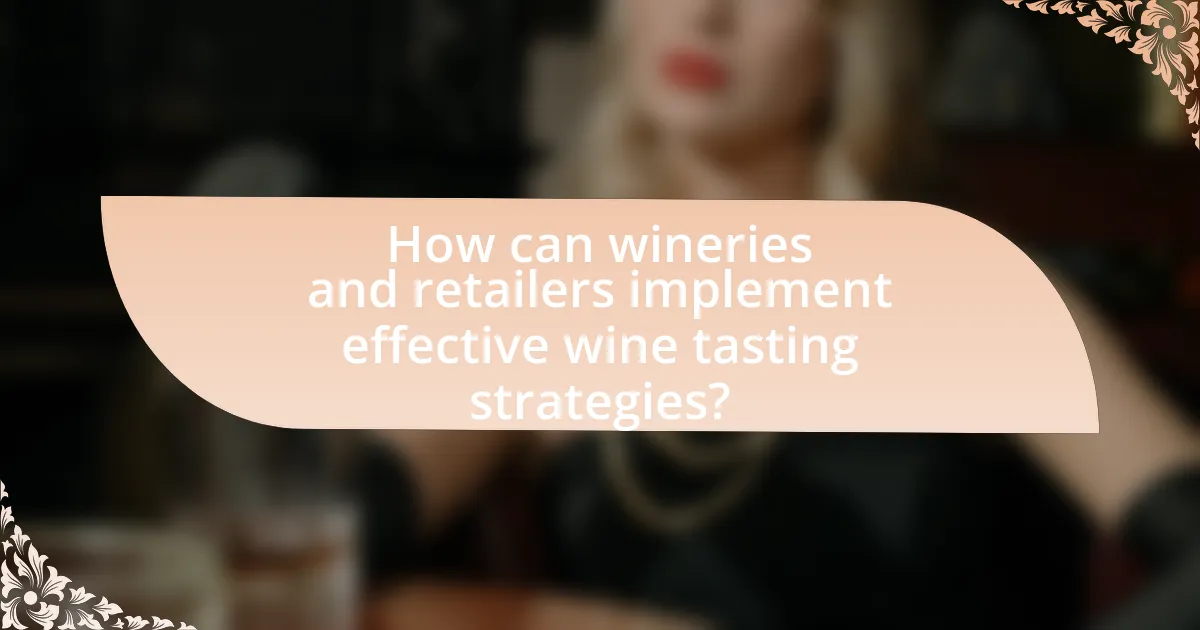The article focuses on creating compelling wine tasting experiences to boost sales. It outlines how immersive events that engage participants through sensory exploration, education, and storytelling can significantly influence consumer behavior and enhance emotional connections with brands. Key elements discussed include the impact of ambiance, the role of knowledgeable staff, and the importance of wine selection and food pairings. Additionally, the article addresses effective marketing strategies, customer engagement techniques, and best practices for hosting successful wine tastings, while also highlighting common challenges faced by wineries and solutions to overcome them.

What are Compelling Wine Tasting Experiences?
Compelling wine tasting experiences are immersive events that engage participants through sensory exploration, education, and storytelling. These experiences often include guided tastings led by knowledgeable sommeliers, interactive elements such as food pairings, and unique settings like vineyards or historic cellars. Research indicates that 70% of consumers are more likely to purchase wine after participating in a tasting event, highlighting the effectiveness of these experiences in boosting sales.
How do wine tasting experiences influence consumer behavior?
Wine tasting experiences significantly influence consumer behavior by enhancing emotional connections and increasing purchase intent. Engaging sensory experiences during tastings lead consumers to form positive associations with specific wines, which can drive brand loyalty. Research indicates that 70% of consumers are more likely to purchase a wine after tasting it, as the immediate sensory feedback reinforces their decision-making process. Additionally, social interactions during tastings create a communal atmosphere that further encourages purchases, as consumers often feel more inclined to buy products that are endorsed by peers.
What psychological factors make wine tastings appealing?
Wine tastings are appealing due to several psychological factors, including social interaction, sensory engagement, and the enhancement of perceived value. Social interaction occurs as participants share experiences and opinions, fostering a sense of community and belonging, which is supported by research indicating that social environments enhance enjoyment (Cialdini, 2009). Sensory engagement is heightened as individuals explore various aromas and flavors, stimulating curiosity and pleasure, which aligns with studies showing that multisensory experiences can increase satisfaction (Spence, 2015). Additionally, the enhancement of perceived value arises from the exclusivity and sophistication associated with wine tastings, as consumers often associate higher prices with better quality, a phenomenon known as the “price-quality effect” (Monroe, 2003). These psychological factors collectively contribute to the appeal of wine tastings, making them a compelling experience for participants.
How does ambiance affect the wine tasting experience?
Ambiance significantly enhances the wine tasting experience by influencing the sensory perceptions of the tasters. A well-designed environment can elevate the enjoyment of wine through elements such as lighting, music, and decor, which collectively create a mood that complements the tasting process. Research indicates that factors like soft lighting and pleasant background music can increase the perceived quality of wine, leading to higher satisfaction levels among tasters. For instance, a study published in the Journal of Wine Economics found that participants rated wines more favorably in environments with ambient music compared to those without. This demonstrates that ambiance not only affects the emotional response but also alters the sensory evaluation of the wine itself.
Why are wine tasting experiences important for sales?
Wine tasting experiences are important for sales because they create an engaging environment that encourages customers to make purchases. These experiences allow consumers to sample products, enhancing their understanding and appreciation of the wine, which can lead to increased sales. Research indicates that sensory experiences, such as tasting, significantly influence consumer behavior, with studies showing that 70% of consumers are more likely to buy a product after tasting it. Additionally, wine tastings foster emotional connections between the consumer and the brand, further driving sales through brand loyalty and repeat purchases.
What role does customer engagement play in boosting sales?
Customer engagement significantly boosts sales by fostering stronger relationships between businesses and their customers. Engaged customers are more likely to make repeat purchases, as they feel a connection to the brand and its offerings. For instance, a study by Gallup found that highly engaged customers represent a 23% premium in terms of share of wallet, profitability, and revenue compared to average customers. This indicates that effective customer engagement strategies, such as personalized experiences during wine tastings, can lead to increased sales and customer loyalty.
How can wine tastings create lasting customer relationships?
Wine tastings can create lasting customer relationships by fostering personal connections and enhancing customer engagement. During these events, customers experience direct interaction with knowledgeable staff, which builds trust and loyalty. Research indicates that 70% of consumers are more likely to return to a business where they feel a personal connection, highlighting the importance of relationship-building in customer retention. Additionally, wine tastings provide an opportunity for customers to explore new products in a social setting, encouraging repeat visits and word-of-mouth referrals. This combination of personal interaction and product exploration solidifies customer loyalty and promotes long-term relationships.

What elements contribute to a successful wine tasting experience?
A successful wine tasting experience is primarily influenced by the quality of the wines, the ambiance of the tasting environment, and the expertise of the host. High-quality wines engage the palate and create memorable impressions, while a well-designed ambiance, including lighting and decor, enhances the overall sensory experience. Additionally, knowledgeable hosts can provide valuable insights into the wines, including their origins and tasting notes, which enriches the experience for participants. Research indicates that engaging storytelling and interaction during tastings can significantly increase customer satisfaction and lead to higher sales conversions.
How can the selection of wines enhance the tasting experience?
The selection of wines can significantly enhance the tasting experience by providing a diverse range of flavors, aromas, and textures that cater to different palates. A well-curated wine selection allows participants to explore various wine styles, such as reds, whites, and sparkling wines, which can evoke different sensory responses and create memorable experiences. For instance, pairing specific wines with complementary foods can elevate the overall tasting, as certain wines enhance the flavors of dishes, leading to a more enjoyable experience. Research indicates that wine and food pairings can improve the perception of both the wine and the food, making the tasting more engaging and satisfying.
What criteria should be used for selecting wines for tastings?
The criteria for selecting wines for tastings include varietal diversity, regional representation, quality ratings, price points, and food pairing compatibility. Varietal diversity ensures a range of flavors and styles, appealing to different palates. Regional representation highlights wines from various geographic areas, showcasing unique terroirs. Quality ratings, such as those from Wine Spectator or Robert Parker, provide a benchmark for selecting high-quality wines. Price points should cater to the target audience, balancing affordability with premium options. Lastly, food pairing compatibility enhances the tasting experience, allowing participants to explore how different wines complement various dishes. These criteria collectively create a well-rounded and engaging wine tasting experience that can effectively boost sales.
How does wine variety impact customer satisfaction?
Wine variety significantly impacts customer satisfaction by influencing taste preferences and overall experience. Different wine varieties cater to diverse palates, which can enhance enjoyment and lead to positive feedback. Research indicates that consumers often associate specific varietals with quality and distinct flavor profiles, affecting their purchasing decisions. For instance, a study published in the Journal of Wine Economics found that customers are more likely to express satisfaction when they find a wine that aligns with their personal taste preferences, highlighting the importance of offering a range of varieties to meet these expectations.
What role does education play in wine tastings?
Education plays a crucial role in wine tastings by enhancing participants’ understanding and appreciation of wine. Knowledge about wine regions, grape varieties, and tasting techniques allows attendees to make informed choices and engage more deeply with the experience. Research indicates that educated consumers are more likely to purchase wine, as they feel more confident in their selections and are better equipped to articulate their preferences. For instance, a study published in the Journal of Wine Economics found that wine education significantly increases consumer willingness to pay for wines, demonstrating the direct impact of education on sales during tastings.
How can knowledgeable staff improve the tasting experience?
Knowledgeable staff can significantly enhance the tasting experience by providing expert insights and personalized recommendations. Their understanding of wine characteristics, such as flavor profiles, regions, and pairing suggestions, allows them to guide customers effectively, making the tasting more engaging and informative. For instance, a study by the Wine Market Council indicates that consumers are more likely to purchase wine when they receive tailored advice from staff, as it fosters a deeper connection to the product. This expertise not only enriches the tasting experience but also builds customer trust and loyalty, ultimately driving sales.
What educational materials can enhance customer understanding of wines?
Educational materials that can enhance customer understanding of wines include wine tasting guides, educational videos, and interactive workshops. Wine tasting guides provide structured information about different wine varieties, regions, and tasting notes, helping customers identify flavors and aromas. Educational videos can visually demonstrate wine production processes and tasting techniques, making complex concepts more accessible. Interactive workshops allow customers to engage directly with wine experts, facilitating hands-on learning experiences that deepen their appreciation and knowledge of wines. These materials collectively contribute to a more informed customer base, ultimately leading to increased sales and customer satisfaction in wine tasting experiences.

How can wineries and retailers implement effective wine tasting strategies?
Wineries and retailers can implement effective wine tasting strategies by creating immersive and educational experiences that engage customers. This can be achieved through structured tastings that highlight the unique characteristics of each wine, providing detailed information about the varietals, regions, and winemaking processes. Research indicates that consumers are more likely to purchase wine after participating in a guided tasting that includes storytelling elements about the wine’s origin and production, as it enhances their emotional connection to the product. Additionally, incorporating food pairings during tastings can elevate the experience, as studies show that food enhances the perception of wine flavors, leading to increased sales.
What marketing techniques can be used to promote wine tastings?
To promote wine tastings effectively, businesses can utilize social media marketing, email campaigns, partnerships with local businesses, and event marketing. Social media platforms like Instagram and Facebook allow for visually appealing content showcasing the wine selection and tasting events, reaching a broad audience. Email campaigns can target existing customers with personalized invitations and exclusive offers, increasing attendance. Collaborating with local restaurants or hotels can create cross-promotional opportunities, attracting their clientele to the wine tasting. Additionally, hosting events at popular venues or during local festivals can enhance visibility and draw in larger crowds. These techniques are supported by the fact that 54% of consumers prefer to learn about events through social media, according to a 2021 Eventbrite survey.
How can social media be leveraged to attract more attendees?
Social media can be leveraged to attract more attendees by creating engaging content that highlights the unique aspects of wine tasting experiences. Utilizing platforms like Instagram and Facebook allows wineries to showcase visually appealing images and videos of their events, which can increase interest and engagement. For instance, a study by Sprout Social found that posts with images receive 650% more engagement than text-only posts. Additionally, targeted advertising on social media can reach specific demographics interested in wine, further enhancing attendance. By encouraging user-generated content through hashtags and contests, wineries can foster a sense of community and excitement around their events, leading to increased participation.
What partnerships can enhance the visibility of wine tasting events?
Strategic partnerships with local restaurants, hotels, and tourism boards can significantly enhance the visibility of wine tasting events. Collaborating with local restaurants allows for cross-promotion, where the restaurant can feature the wine tasting event on their menu or social media, attracting their clientele. Partnering with hotels can provide package deals for guests, increasing attendance from tourists. Additionally, working with tourism boards can help in promoting the event through their marketing channels, reaching a broader audience interested in local experiences. These partnerships leverage existing customer bases and marketing resources, effectively increasing event visibility and attendance.
What are best practices for hosting a wine tasting event?
The best practices for hosting a wine tasting event include selecting a suitable venue, curating a diverse selection of wines, and providing knowledgeable staff to guide participants. A suitable venue should accommodate the expected number of guests comfortably and create an inviting atmosphere. Curating a diverse selection of wines allows guests to experience different varietals, regions, and styles, enhancing their appreciation and engagement. Knowledgeable staff can offer insights into each wine, answer questions, and facilitate discussions, which enriches the tasting experience. Additionally, incorporating food pairings can complement the wines and elevate the overall event. These practices are supported by industry standards that emphasize guest experience as a key factor in successful wine tastings.
How can event logistics be optimized for a better experience?
Event logistics can be optimized for a better experience by implementing advanced planning, effective communication, and utilizing technology. Advanced planning involves creating a detailed timeline and checklist to ensure all aspects of the event, such as venue selection, catering, and staffing, are addressed well in advance. Effective communication among team members and with vendors ensures that everyone is aligned on expectations and responsibilities, reducing the likelihood of errors. Utilizing technology, such as event management software and mobile apps, can streamline registration, enhance attendee engagement, and provide real-time updates, which improves the overall experience. For instance, a study by Eventbrite found that 80% of event organizers who used technology reported higher attendee satisfaction.
What follow-up strategies can help convert attendees into customers?
Follow-up strategies that can help convert attendees into customers include personalized email outreach, offering exclusive discounts, and providing additional educational content. Personalized emails that reference specific interactions during the wine tasting can increase engagement, as studies show that tailored communication improves response rates by 26%. Offering exclusive discounts to attendees creates a sense of urgency and incentivizes immediate purchases, with research indicating that limited-time offers can boost conversion rates by up to 50%. Additionally, providing educational content, such as wine pairing guides or tasting notes, reinforces the value of the experience and encourages attendees to make informed purchasing decisions, leading to higher customer retention rates.
What common challenges do wineries face in creating compelling wine tastings?
Wineries commonly face challenges such as limited resources, lack of trained staff, and difficulty in differentiating their offerings. Limited resources can restrict the ability to create diverse tasting experiences, impacting customer engagement. A lack of trained staff may lead to inadequate customer service and insufficient knowledge about the wines, which diminishes the overall tasting experience. Additionally, wineries often struggle to differentiate their offerings in a saturated market, making it hard to attract and retain customers. These challenges can hinder the effectiveness of wine tastings in boosting sales and enhancing brand loyalty.
How can wineries overcome budget constraints for tastings?
Wineries can overcome budget constraints for tastings by implementing cost-effective strategies such as utilizing local partnerships, optimizing staffing, and leveraging technology. Collaborating with local businesses can reduce costs by sharing resources and attracting a wider audience, as seen in successful joint events that increase foot traffic. Additionally, optimizing staffing by training existing employees to manage tastings can minimize labor costs while maintaining quality. Utilizing technology, such as virtual tastings or online booking systems, can also reduce overhead and enhance customer engagement, as evidenced by a 2021 study showing that wineries adopting digital platforms saw a 30% increase in participation rates.
What strategies can address low attendance at wine tasting events?
To address low attendance at wine tasting events, organizers can implement targeted marketing strategies, enhance the tasting experience, and offer incentives. Targeted marketing, such as utilizing social media platforms and email campaigns, can effectively reach potential attendees by promoting the unique aspects of the event. Enhancing the tasting experience through interactive elements, such as food pairings or educational sessions led by sommeliers, can attract a broader audience. Additionally, offering incentives like early bird discounts or group rates can encourage more people to attend. Research indicates that events with engaging activities and clear value propositions see higher participation rates, demonstrating the effectiveness of these strategies.
What practical tips can enhance wine tasting experiences to boost sales?
To enhance wine tasting experiences and boost sales, wineries should focus on creating an engaging atmosphere, providing knowledgeable staff, and offering food pairings. An engaging atmosphere, such as a well-decorated tasting room or outdoor space, encourages customers to linger and enjoy their experience, which can lead to increased purchases. Knowledgeable staff can enhance the experience by sharing interesting stories about the wines, which fosters a connection between the customer and the product, ultimately driving sales. Additionally, offering food pairings can elevate the tasting experience, as studies show that complementary food can enhance the perception of wine flavors, making customers more likely to buy both wine and food.